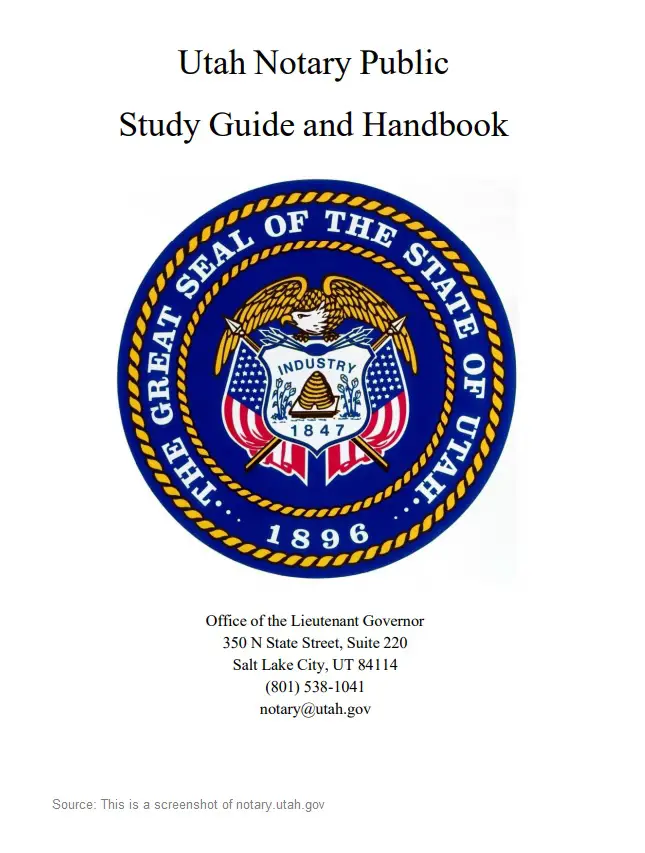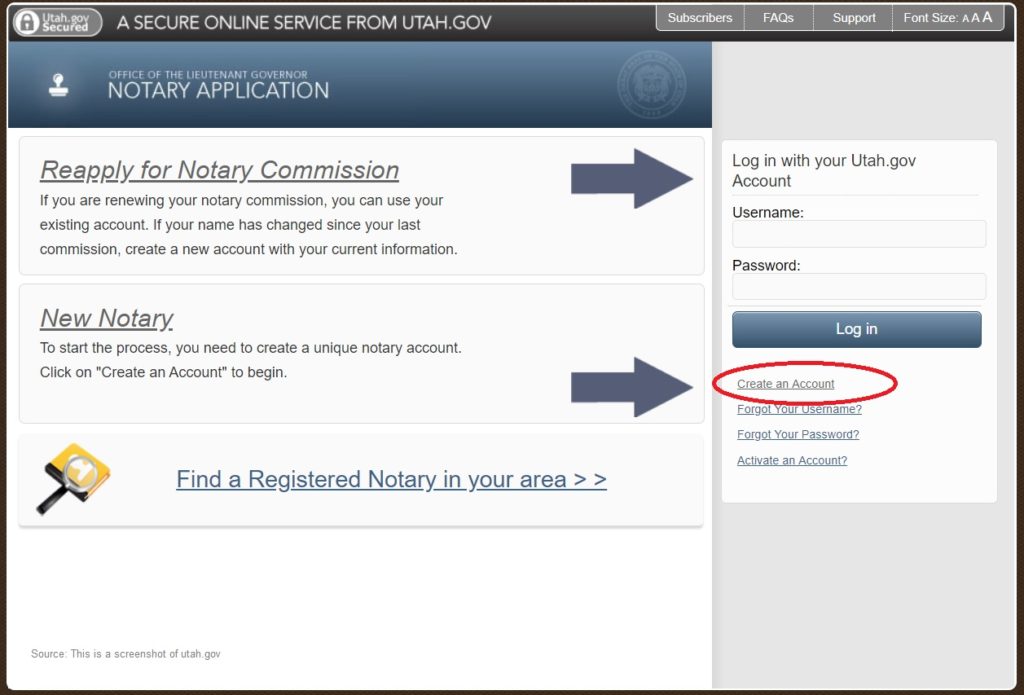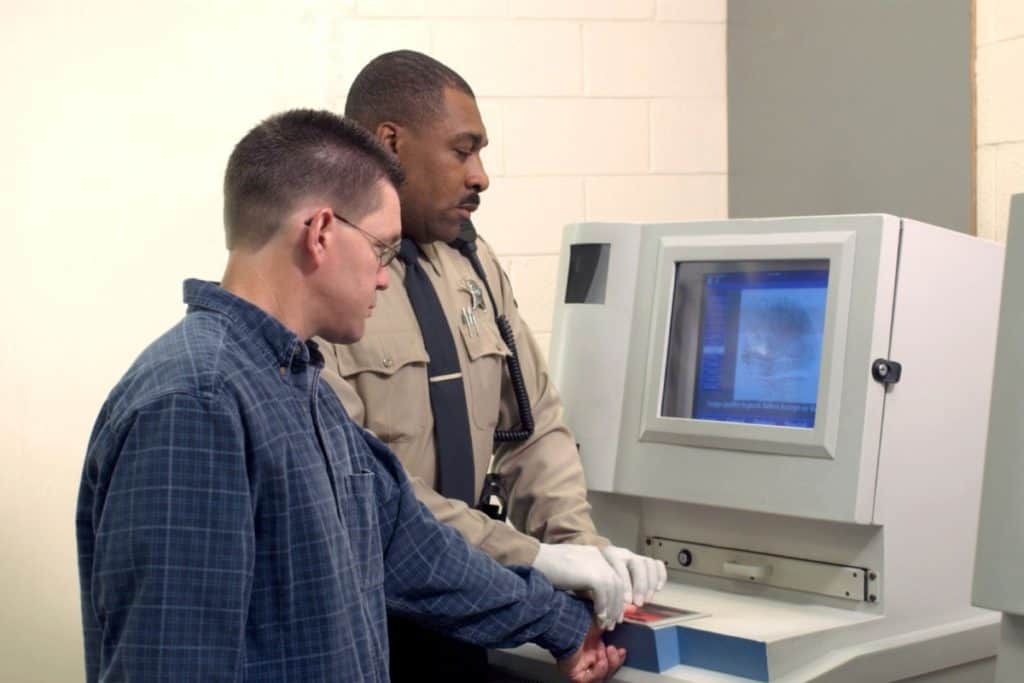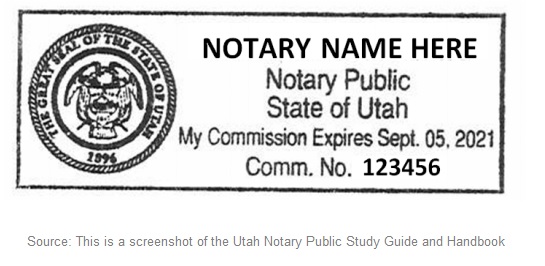(**) Disclosure: This post may contain affiliate links, meaning our company, JCHQ Publishing will get a commission if you decide to make a purchase through the links, but at no additional cost to you.
To become a notary loan signing agent in Utah, you must:
- Meet the eligibility requirement;
- Pass the Utah notary test;
- Perform a background check;
- Obtain a $5,000 surety bond;
- Take an oath of office;
- Submit a notary public application and $95 fee to the Office of the Utah Lieutenant Governor;
- Review the notary certificate of commission;
- Purchase a notary seal;
- Maintain a business journal;
- Keep up with notarial best practice
Although you could work on different types of documents (i.e., POA, marriage certificate, living will), the loan signing business in the real estate market seems to be a lucrative niche.
So what does a loan signing agent do? When people are getting a mortgage to purchase a house, or they need to refinance their property, there will be loan documents involved. Your role as a notary loan signing agent is to walk through the set of loan documents with the borrower and witness them in signing the paperwork.
You would also need to verify the identity of the signers, place the notary stamp on the signed documents, then send them back to the signing services company or closing attorney.
But keep in mind that you should NOT be providing legal advice, and you cannot explain the terms of the loan documents to the borrower.
In this guide, you’ll find out the steps to become a notary in Utah, income updates, and FAQ about this profession.
But before we start, I want to give a brief disclaimer. This post is not intended as legal advice or state/federal notary public training. It is for general information only. Please check with your state to be sure that loan signing agents are utilized in the closing process. Always follow your state’s notary laws and best practices.
Would you like to learn how to make $75 to $200 per signing appointment? You must check out the Loan Signing System from Mark Wills. (**) This is one of the best training programs for loan signing agents. Many students have achieved remarkable business success after taking this program.
A Table Summary to Become a Notary in Utah
| Age | Notary Course | Exam | Surety Bond | Term of Office | Fees |
|---|---|---|---|---|---|
| At least 18 | No | Yes | $5,000 | 4 years | $95 – ($55 for application; $40 for testing) |
11 Steps to Become a Notary in Utah

Step 1: Meet the state-eligibility requirement
- At least age 18 of age;
- U.S Citizen or permanent resident status under Section 245 of the Immigration and Nationality Act;
- Lawfully reside in Utah 30 days before the filing for notarial commission
- Able to read, write and understand English
Step 2: Study for the Utah notary test
The Utah Office needs to ensure that you have sufficient knowledge to perform notarization properly, so you must pass a test before getting the commission.
A good way to prepare for it is to study the “Utah Notary Public Study Guide and Handbook.”

This is a 39-pages comprehensive guide that covers the following topics:
- Becoming a notary
- Qualification
- How to use notary.utah.gov
- Taking the test
- Top ten mistakes made by notaries
- New laws 2017 and what they mean to the notary
- Examples of Notarial Certificate
- Acknowledgment
- Attorney-in-fact-acknowledgment
- Copy Certification
- Credible Witness Acknowledgment
- Jurat
- Signature Witnessing
- Corporate Acknowledgment
- Utah Code Annotated § Title 46 Chapter 1 Notaries Public Amendments
- 5 Steps To Completing a Correct Notarization of a Signature
Furthermore, as I’m reading the handbook, a section explicitly mentions the Top Ten Mistakes of Notaries Public. You may want to pay close attention to that.
1. Leaving out the notarial language
2. Confusing the notarial acts
3. Misinterpreting electronic signature/notarization
4. Failing to require Personal Appearance
5. Failing to name the appearing signer
6. Adopting policies contrary to UCA 46-1-8
7. Failing to require proper I.D.
8. Refusing documents solely for their content
9. Leaving the notary seal and certificate with the employer upon termination of employment
10. Executing “materially incomplete” certificates
Quote from Utah Notary Public Study Guide and Handbook
Another excellent resource is the Utah Code, Title 46.
- Chapter 1 – Notaries Public Reform Act
- Chapter 4- Uniform Electronic Transactions Act
- Chapter 5 – Uniform Electronic Legal Material Act
These chapters cover every detail about being a notary. However, its wording is more technical and formal than the ones in the Handbook.
But it indeed is a good reference if you want to know more in-depth about a specific topic. I’ll leave the links of the Notary Public Handbook and the Utah Code in the reference section.
Step 3: Submit the application to the Utah Office of Lieutenant Governor

The Utah Office of Lieutenant Governor is responsible for appointing and commissioning notaries. You need to fill out the online application.
You must create an online account on the Lieutenant Governor’s website. On their registration page, you need to input a username, password, and other personal info such as email address, name, phone number, email address.
Note that your business address and work phone will be made public on the Utah Notary Search. If you did not specify the details, the Office would use your home or cell phone by default in the public search.
Most of the questions in the application are pretty strict forward—for example, your name, business address, background info. It’s better to check that the name on the application will be the same as when you are notarizing documents.
There is a $55 initial application fee and $40 testing fee. ($95 in total)
Step 4: Pass the Utah notary test

This test is to see how well you know about the Utah notary laws, procedures, and ethics.
The test consists of 35 questions.
- 10 of them worth 4 points each
- 25 of them worth 1 point each
The total score would be 65 points, and you must achieve at least 61 points or higher to pass it. The testing fee is $40.
If you don’t pass it, you can take it again within 30 days by paying another $40. But if you retake it after 30 days, you would be charged for another full $95.
Step 5: Perform a background check

The Utah Lieutenant Governor Office needs to ensure that you can serve the public interest. So they will conduct a background check on you. You would fill out a waiver form that consents the Departement of Human Resource Management to perform a background check.
However, the Lieutenant Governor cannot disclose any specific results or issue copies of the background check. So you may continue to the next steps, which are obtaining the notarial bond and taking an oath of office.
Step 6: Obtain a surety bond

The Utah Office of Lieutenant Governor requires you to purchase a $5,000 surety bond with a 4 years term. You may get it from a licensed surety such as a notary bonding company, an insurance company, or a notary organization. You could search for them online.
Note that the surety bond is to protect those for whom the notary public performs a notarization, but not you as a notary public. If you need coverage for your practice, you should consider getting an Error & Omission insurance (E&O).
I just checked with a surety bond issuer. Below is their premium structure.
| Coverage | Premium |
|---|---|
| $5,000 without E&O coverage | $50 |
| $5,000 bond with $10,000 E&O coverage | $90 |
| $5,000 bond with $20,000 E&O coverage | $110 |
| $5,000 bond with $30,000 E&O coverage | $130 |
Source: Suretybonds.com (Sept 22, 2020)
Step 7: Take an oath of office
The oath is an affirmation that you agree to assume the duties of a notary public and will comply with the Utah notary acts. You must take an oath of office and sign it in the presence of a Utah notary public.
The notary public also needs to sign it and affix a seal on it.
Then you would log in to your account at the Lieutenant Governor’s website and upload a copy of the oath and notarial bond.
Step 8: Review the notary commission certificate

Once your application is approved, you will receive the Notary Commission Certificate from the Utah Office of Lieutenant Governor. They will email it to you. The process should take less than 2 weeks.
It is a good idea to review and make sure all the details on the commission are correct. (e.g., your name, county of residence, term of commission).
Step 9: Get a notary seal

To start a signing services business in Utah, you may use a notary seal. It is a helpful business tool that ensures you won’t leave out any required details. It indicates the signing agent as an impartial witness and helps to prevent fraudulent acts.
You may purchase the notary seal from office supplies store. Its design must comply with the regulatory rules. For example, it must contains the following:
- The words “notary public,” “state of Utah,” and “my commission expires on (commission expiration date)”;
- Your name and commission number as appear on the notary commission;
The notary seal needs to have a rectangular border no greater than one inch by two and one-half inches surrounding the required words. Also, its impression must be sharp, legible, and photographically reproducible.
Here is a sample of a Utah notary seal:

Since the seal contains the commission expiry date, you need to get a new one for each term of office.
Step 10: Maintain a notary journal

Although it is not required to keep a notary journal in Utah, maintaining a good record of your notary acts is an essential part of good business practice. It could serve as proof that you have taken reasonable steps to identify the signer of a document.
If your journal is maintained in a physical format, you should have one bounded with numbered pages. You may find it at stationery, office supply stores, or through notary associations.
Whereas for a journal in an electronic format, it needs to be a permanent, tamper-evident. Make sure that it is complying with the rules of the Utah Office of Lieutenant Governor.
In the notary journal, you may consider recording the following items in each entry:
- Date on Document;
- Date Notarial Act Performed;
- Type of Document;
- Type of ID presented by Principal(s);
- Printed Name of Principal(s);
- Printed Address of Principal(s);
- Signature of Principal(s)
Step 11: Keep up with notarial best practice
Continuing education is critical to being a notary signing agent. Rules and regulations would change over time. Also, there will be new technology to advance your business practice. A good way is to take high-quality courses from a trusted provider.
Learn to earn as a Loan Signing Agent
Without sufficient income, you are just doing it as a hobby and not a real business. The first step you should take is to learn how to build a “PROFITABLE” notarial practice.
But this could take years of trial and error in coming up with a feasible strategy. Rather than reinventing the wheel, a MUCH better way is to learn from someone who has done it before successfully.
Mark Wills is a top-notch coach for notary signing agents. He developed the Loan Signing System (LSS) training program, where many of his students have achieved massive success. Some can earn great money as a side-gig, where some are earning over six-figures every year.
You may click here to check out his training program. (**)
Advance your credential by becoming an NNA Certified Notary Signing Agent

The National Notary Association (NNA) is one of the largest associations and most recognizable for notaries. They provide regular updates, training and networking events to the members.
Getting the NNA Certified status can show to title and escrow companies that you are maintaining a high standard as a signing agent. Thus, strengthen their trust and confidence in your signing services.
>>Here is a review I wrote about the NNA Certified Notary Signing Agent Program<<
In there, you can find an exclusive interview I had with Melina Fuenmayor. She will share with you her thoughts in obtaining the certified credential.
Does Utah allow electronic notarization?

I like states that have the option for notaries to work digitally. Doing so could bring you great convenience to streamline your notary practice.
Electronic Notarization, also known as “e-notarization” is where the signings and document transmission can be done electronically. But you’ll still need to meet the signer in-person to verify their identity.
You can perform “electronic notarization” in Utah. But the meeting must be conducted within the state of Utah.
An electronic notarization would involve:
- Electronic document
- Digital notary seal
- Digital signatures of the notary and signer
Does Utah allow remote online notarization (RON)?

Remote online notarization (RON) is allowed in Utah. It gives you the convenience not to be physically present with the signer. Instead, you would verify their the signer’s identity through video and audio conference.
To become an remote online notary in Utah, you must:
1) Choose a technology provider
As a notary signing agent, you would be handling documents with confidential details. Therefore, it is critical to choose a technology platform with a high level of security.
Below is a list of approved technology providers I found on the Utah Office of Lieutenant Governor website.
2) Increase the surety bond coverage to $10,000
Typically speaking, this can be done by requesting the bond company to add a rider or adjustment to your current coverage. Or you may also obtain another $5,000 bond coverage.
| Coverage | Premium |
|---|---|
| $10,000 bond without E&O coverage | $100 |
| $10,000 bond with $10,000 E&O coverage | $140 |
| $10,000 bond with $20,000 E&O coverage | $160 |
| $10,000 bond with $30,000 E&O coverage | $180 |
Source: Suretybonds.com (Sept 22, 2020)
3) Obtain Electronic Seal/Signature
Each technology vendor will have a unique digital signature/seal. It usually would have a timestamp or a method to digitally track when it was signed. You must attach one when submitting the application to the Lt. Governor’s office.
4) Register at the Utah Office of Lieutenant Governor
Similar to the initial application process, you need to submit an application to the Office and pay the $50.
If you haven’t done the background check before, you would need to do it at this stage. Once the Office approves your application, you will receive an email confirmation. And you will be marked as an active remote notary in the system.
5) Keep a notary journal
Unlike traditional notarization, all remote notaries must keep a secure electronic notarial journal. Typically speaking, approved technology
platforms will have the electronic journal feature.
How to become a mobile notary in Utah?
Some signers cannot travel to your office in signing the documents, and they do not have the technology to perform the remote notarization. In such a situation, there would be a demand for a mobile notary. In short, a mobile notary is merely a notary that travels around in meeting signers.
To become a mobile notary in Utah, you must:
- Register with the Utah Office of Lieutenant Governor as a notary. This is basically the same notary commission certificate, as discussed earlier. You don’t need to get a new one.
- Have ease of transportation. It is better to have your own car so that you could conveniently drive between appointments.
- Setup essential equipment: A mobile printer and an approved electronic notarization platform allow you to work on the documents whenever and wherever. You may check out our resource page for amazingly helpful tools that could streamline your business.
How much do notary loan signing agents make in Utah?

The average annual income of Loan Signing Agents in Utah is $47,105. The income typically ranges between $27,741 to $56,408. Top earning loan signing agents in Utah are making over $84,149.
As a notary loan signing agent, you could work on different documents, but the loan signing in the real estate market could be a lucrative niche.
Top 10 Highest Paying Cities for Loan Signing Agents in Utah
| City | Annual Salary |
|---|---|
| West Valley City | $50,433 |
| Orem | $46,001 |
| St. George | $45,835 |
| Sandy | $43,651 |
| West Jordan | $43,634 |
| Layton | $43,437 |
| Salt Lake City | $43,158 |
| Ogden | $42,913 |
| Provo | $40,643 |
| Logan | $40,073 |
Source: ZipRecruiter.com – March 14, 2022
Can you make over $10,000/month as a loan signing agent? Be sure to check out our notary earning guide. You’ll find a case study where a loan signing agent has built her business to such a successful figure.
Is there demand for notary loan signing agent in Utah?
As long as people are obtaining mortgages or refinancing their homes, there would be a demand for notary loan signing agents.
All originated mortgages in Utah
| YEAR | RECORDS |
|---|---|
| 2017 | 108,018 |
| 2016 | 126,325 |
| 2015 | 105,929 |
| 2014 | 76,563 |
| 2013 | 99,424 |
| 2012 | 125,331 |
| 2011 | 77,763 |
| 2010 | 101,108 |
| 2009 | 127,680 |
| 2008 | 98,555 |
| 2007 | 136,628 |
Source: Consumer Financial Protection Bureau – Home Mortgage Disclosure Act (HMDA) (Sept 22, 2020)
According to the Utah Notary Administration database, they are 22,859 active notaries, but only 194 are remote online notaries. Therefore, you definitely should consider incorporating E-Notarization and RON in your practice to maintain a competitive edge.
Furthermore, some states are “Attorney States,” which means only attorneys can coordinate the closing paperwork of a real estate. Whereas, others are “Escrow States” where escrow companies would handle the mortgage closing.
According to the First American Title, Utah is not an “Attorney State.”
Here is a post covering the differences between escrow states and attorney states and its impact on the loan signing business. You will also find a case study where a signing agent went from barely making end needs to earning over $10,000/month even in an attorney state.
If you want to succeed in the loan signing industry, you must check out this loan system training program. If you review the testimonials of his students, you’ll be amazed at how the notary career changes their life after they learned from Mark Wills. (**)
How much does it cost to become a notary in Utah?

It would cost approximately $280 to become a notary in Utah.
Here’s a breakdown of the costs to start a notary signing business
| Notary application fee | $55 |
| Testing fee | $40 |
| Remote online notary application fee | $50 |
| $10,000 Surety bond without E&O | $100 |
| Notary seal | $20 |
| Journal | $15 |
There could be other expenses involved, travel expenses, car maintenance, auto insurance, E&O coverage, remote notary technology, laptop and other business supplies.
Can a felon be a notary in Utah?

Having a conviction for a felony may impact the application to become a notary in Utah. The Utah Office of Lieutenant Governor needs to make sure that you are a person with credibility, truthfulness, and integrity to fulfill the responsibilities of the position.
However, having a felony does not necessarily mean your application will automatically be declined. It depends on the severity and nature of the conviction. The Utah Office of Lieutenant Governor would review it on a case-by-case basis.
(4) The lieutenant governor may deny an application based on:
(a) the applicant’s conviction for a crime involving dishonesty or moral turpitude;
(b) any revocation, suspension, or restriction of a notarial commission or professional license issued to the applicant by this or any other state;
Quote from Utah Code Title 46-1-3 Qualifications
How long does it take to become a notary in Utah?
It takes under two weeks to become a notary in Utah. After you pass the notary test, you would obtain the surety bond, take an oath of office, submit the application and all required documents to the Utah Office of Lieutenant Governor.
Once everything is in good order, the Utah Office of Lieutenant Governor will email you the notary certificate. Then you could purchase the notary seal and journal.
How to renew notary commission in Utah?

You must reapply the notary commission every four year. The steps are similar as you were applying for the initial application.
- Login to your account on the Office of the Utah Lieutenant Governor’s website
- Take the test
- Pay the $95 fee
- File a new surety bond and take an oath of office
- Get a notary seal with a new commission expiry date
To avoid an interrupted business period, don’t wait till your current notary commission is expired.
Can a notary refuse to notarize a document in Utah?
You may refuse to notarize a document in Utah if it is an unlawful transaction. And you should record in the journal with a detailed description why you refused to perform or complete a notarial act.
Can I notarize for a family member in Utah?

You must not notarize any documents where you have any financial or beneficial interest in the transaction. Therefore, notarizing a document for any family member could call into question, and such practice should be avoided.
I have more questions about being a notary public in Utah, where could I obtain more details?
- Mailing Address: Notary Office, Utah State Capitol, PO Box 142325, 350 N State St. Suite 220, Salt Lake City, UT 84114
- Phone: 801-538-1041
A real life story of a successful notary public and loan signing agent

What’s a better way to learn about the business than learning from someone actually working in it! Here is an exclusive interview I conducted with Luisa Cook. She is a successful Certified Notary Public and Loan Signing Agent.
In there, she shared her journey and business strategy in running a notary and signing business. I’m sure this could help you to understand more about the notary career.
Jacob: “Here’s a review of the Loan Signing System training. In there, you will find out the course curriculum, costs, and student ratings from different sources. I have talked to several notary signing agents who took the course. They will share with you their first-hand thoughts about the LSS.“
Disclaimer: The information in this post is for general information only, and not intend to provide any advice. They are subjected to change without any notice, and not guaranteed to be error-free. Some of the posts on this site may contain views and opinions from individual not related to JCHQ Publishing. They do not necessarily reflect our view or position.
(**) Affiliate Disclosure: Please note that some of the links above are affiliate links, and at no additional cost to you. Our company, JCHQ Publishing will earn a commission if you decide to make a purchase after clicking on the link. Please understand that we include them based on our experience or the research on these companies or products, and we recommend them because they are helpful and useful, not because of the small commissions we make if you decide to buy something through the links. Please do not spend any money on these products unless you feel you need them or that they will help you achieve your goals.
Reference:
- First American Title- Your Guide to Real Estate Customs by State (source)
- The Office of the UTAH Lieutenant Governor (source)
- Salary.com – Notary Signing Agent Salary in Utah (source)
- ZipRecruiter – Loan Signing Agent Salary in Utah (source)
- SuretyBonds.com – Utah Notary Bond (source)
- Consumer Financial Protection Bureau – Home Mortgage Disclosure Act (HMDA) (source)

